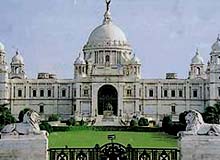 The Victoria Memorial was built to commemorate the peak of the British Empire in India. The Victoria Memorial, conceived by Lord Curzon, represents the architectural climax of Kolkata city. Lord Curzon, the then Viceroy specified its classical style but the actual plan of Victoria Memorial was laid down by the well-known architect, Sir William Emerson. The Victoria Memorial blends the best of the British and Mughal architecture. The Victoria Memorial hall was built with white Makrana marbles. The Prince of Wales laid the foundation stone of Victoria Memorial in 1906 and it was inaugurated in 1921 in memory of Queen Victoria. The Victoria Memorial is 338 by 228 feet and a height of 184 feet.
The Victoria Memorial was built to commemorate the peak of the British Empire in India. The Victoria Memorial, conceived by Lord Curzon, represents the architectural climax of Kolkata city. Lord Curzon, the then Viceroy specified its classical style but the actual plan of Victoria Memorial was laid down by the well-known architect, Sir William Emerson. The Victoria Memorial blends the best of the British and Mughal architecture. The Victoria Memorial hall was built with white Makrana marbles. The Prince of Wales laid the foundation stone of Victoria Memorial in 1906 and it was inaugurated in 1921 in memory of Queen Victoria. The Victoria Memorial is 338 by 228 feet and a height of 184 feet. Today the Victoria Memorial Hall is a museum having an assortment of Victoria memorabilia, British Raj paintings and other displays. As night descends on Calcutta, the Victoria Memorial Hall is illuminated, giving it a fairy tale look. It is interesting to note that the Victoria Memorial was built without British government funds. The money required for the construction of the stately building, surrounded by beautiful gardens over 64 acres and costing more than 10 million was contributed by British Indian states and individuals who wanted favors with the British government. At the top of the Victoria Memorial is a sixteen foot tall bronze statue of victory, mounted on ball bearings. It rotates with wind.
At present the Victoria Memorial has notable collection of weapons, sculptors, paintings, maps, coins, stamps, artifacts, textiles etc. The Royal gallery in Victoria Memorial has portraits of the Queen and Prince Albert. There are numerous paintings, illustrating events from Victoria's life. Another remarkable peace in Victoria Memorial is a painting by the Russian artist Vasseli Verestchagin, portraying the state entry of the Prince of Wales in Jaipur in the year 1876. In the post independence period a new addition was made to the Victoria Memorial. It was the addition of the National leaders' gallery with the portraits and relics of the freedom fighters.
No comments:
Post a Comment